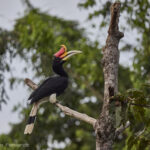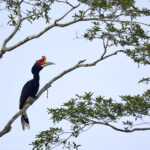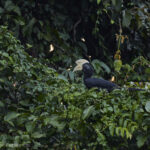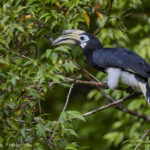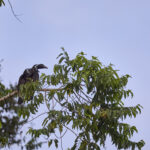Wrinkled hornbill or Sunda wrinkled hornbill – Rhabdotorrhinus corrugatus (Temminck, 1832) – of Borneo (100m ASL)
Rhabdotorrhinus corrugatus, the wrinkled hornbill, is a canopy frugivore of the Sunda region, occurring in southern Thailand, Peninsular Malaysia, Borneo, Sumatra and nearby islands, where it inhabits primary lowland rainforest including coastal swamp forest and has been assessed as Endangered due to rapid forest loss across its range. Adults are about sixty five to seventy five centimeters in length; males show a tall red and visibly wrinkled casque with a pale face and throat often stained yellow by preen oil, while females are smaller and largely black with a blue throat, and both sexes have blue orbital skin. The species feeds mainly on drupes and other fruits from families such as Lauraceae, Myristicaceae and Myrtaceae and also takes invertebrates and small vertebrates; like other Asian hornbills it is an important long distance seed disperser in tropical forests. Breeding takes place in tree cavities and, as is typical for hornbills, the female seals the entrance and is fed by the male through a narrow slit until the young are ready to fledge. The generic name Rhabdotorrhinus combines the Greek rhabdotos meaning striped and rhis or rhinos meaning nose, and the epithet corrugatus is Latin for wrinkled, a clear nod to the corrugated casque that characterizes this species.
